
OCEAN DYNAMICS
Scope & Guideline
Navigating the Future of Ocean Science
Introduction
Aims and Scopes
- Physical Oceanography:
Research on the dynamics of ocean currents, tides, and waves, focusing on their interactions with the atmosphere and their influence on climate patterns. - Coastal and Shelf Dynamics:
Investigation of processes affecting coastal regions, including sediment transport, estuarine dynamics, and the impact of human activities such as coastal reclamation. - Ocean-Climate Interactions:
Studies exploring the links between ocean processes and climate variability, including the effects of oceanic conditions on weather patterns and climate change. - Marine Ecosystem Dynamics:
Research on the relationships between physical ocean dynamics and marine biological processes, including phytoplankton dynamics and the impacts of environmental changes on marine ecosystems. - Modeling and Data Assimilation:
Development of numerical models for simulating ocean dynamics and the use of data assimilation techniques to improve model accuracy and forecast capabilities. - Remote Sensing and Observational Studies:
Utilization of satellite and in-situ data for monitoring ocean conditions, including wave heights, sea surface temperatures, and chlorophyll-a concentrations.
Trending and Emerging
- Impact of Climate Change on Ocean Dynamics:
Research increasingly addresses how climate change affects ocean currents, sea-level rise, and extreme weather events, reflecting a growing concern for the implications of global warming. - Microplastics and Marine Pollution:
There is a notable increase in studies focused on the transport and impact of microplastics in ocean systems, highlighting the pressing issue of marine pollution and its ecological consequences. - Advanced Data Assimilation Techniques:
Emerging methods for data assimilation in ocean modeling are gaining prominence, allowing for improved forecasting and better integration of observational data. - Interdisciplinary Approaches:
There is a growing trend towards interdisciplinary research that combines oceanography with fields such as ecology, economics, and atmospheric science, reflecting a holistic view of ocean systems. - High-Resolution Modeling:
The use of high-resolution models to study submesoscale processes and their effects on larger scale ocean dynamics is becoming more prevalent, indicating a trend towards detailed and localized oceanographic studies.
Declining or Waning
- Traditional Tidal Studies:
Research focused solely on tidal dynamics without the integration of other oceanographic processes has become less common as studies increasingly incorporate the effects of climate change and human activities. - Simplistic Wave Modeling:
Older methodologies for wave modeling that do not take into account the complexities of ocean-atmosphere interactions are being phased out in favor of more sophisticated, integrated approaches. - Static Observational Studies:
Research relying solely on static observational data without dynamic modeling or analysis has decreased as the field moves towards more comprehensive, real-time data integration. - Historical Climate Analysis:
While important, studies that focus exclusively on historical climate data without linking them to current ocean dynamics or predictive modeling are becoming less prevalent in favor of forward-looking research.
Similar Journals
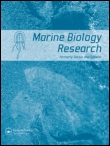
Marine Biology Research
Connecting researchers to preserve our oceans.Marine Biology Research is a premier journal published by Taylor & Francis, focusing on the dynamic field of marine biology and its intersecting realms of aquatic science, ecology, and oceanography. Since its inception in 2005, this journal has served as a crucial platform for researchers and professionals to disseminate their findings, with a vision extending to 2024 and beyond. The journal is recognized with a Q3 quartile ranking in both Aquatic Science and Ecology, Evolution, Behavior and Systematics, underscoring its growing influence in these fields as evidenced by its Scopus rankings. Located in the United Kingdom, Marine Biology Research aims to foster collaboration and innovation through open access options, facilitating knowledge exchange among the academic community. With a steady commitment to advancing marine sciences, this journal is an invaluable resource for those dedicated to understanding and preserving our ocean ecosystems.

JOURNAL OF OCEANOGRAPHY
Exploring the Depths of Marine ScienceJOURNAL OF OCEANOGRAPHY, published by Springer, stands as a leading academic journal in the field, with an impressive Q1 ranking in Oceanography for 2023. Since its inception in 1992, this journal has dedicated itself to the dissemination of high-quality research that spans a diverse array of topics within oceanography and earth sciences. With an ISSN of 0916-8370 and an E-ISSN of 1573-868X, it plays a crucial role in bridging the gap between academia and practical marine applications. The journal is indexed in Scopus, ranking #57 out of 145 in its category, reflecting its rigorous academic standards and the impact of its published works, reaching a notable ile in the 61st percentile. Located in Japan, the JOURNAL OF OCEANOGRAPHY provides a vital platform for sharing significant research findings that contribute to our understanding of marine environments, aiming to foster interdisciplinary collaboration among researchers, professionals, and students dedicated to marine science.

Ocean Science
Unveiling the Secrets of Our OceansOcean Science, published by COPERNICUS GESELLSCHAFT MBH, stands as a premier Open Access journal in the fields of Oceanography and Paleontology, with a commendable impact factor that highlights its influence in the scientific community. Since its inception in 2005, Ocean Science has provided a vital platform for the dissemination of innovative research and discoveries, boasting prestigious rankings of Q1 in both Oceanography and Paleontology categories as of 2023, along with impressive Scopus rankings (7th in Paleontology and 28th in Oceanography). Based in Göttingen, Germany, the journal's commitment to open access ensures that groundbreaking research is readily available to a global audience, fostering knowledge sharing and collaboration among academics, professionals, and students alike. As it converges towards its 20th anniversary in 2024, Ocean Science continues to be an essential resource for those dedicated to advancing our understanding of the marine environment and its geological history.
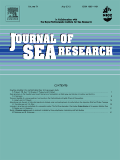
JOURNAL OF SEA RESEARCH
Navigating the Frontiers of Oceanography and EcologyJOURNAL OF SEA RESEARCH, published by Elsevier, is a premier academic journal dedicated to advancing knowledge in the fields of aquatic science, ecology, and oceanography. Since its inception in 1996, this journal has provided a vital platform for researchers and professionals to disseminate groundbreaking findings and promote fostering interdisciplinary discussions. With its impressive Q2 ranking in multiple categories, including Aquatic Science and Ecology, Evolution, Behavior and Systematics, it positions itself as a significant contributor to marine and environmental studies. The journal is accessible in both print (ISSN: 1385-1101) and online formats (E-ISSN: 1873-1414), ensuring wide reach and engagement within the scholarly community. Researchers and students alike will find the journal not only a reliable source of information but also a source of inspiration for future explorations. With a commitment to quality and a broad scope that spans fundamental to applied research, JOURNAL OF SEA RESEARCH remains an indispensable resource for understanding the complexities of marine environments and their relevance to our changing world.

JOURNAL OF WATERWAY PORT COASTAL AND OCEAN ENGINEERING
Pioneering Sustainable Solutions for Aquatic EnvironmentsThe JOURNAL OF WATERWAY PORT COASTAL AND OCEAN ENGINEERING, published by the ASCE - American Society of Civil Engineers, is a premier scholarly journal devoted to the interdisciplinary fields of waterway, port, coastal, and ocean engineering. Since its inception in 1982, the journal has provided a crucial platform for researchers, professionals, and students to share innovative findings and advancements related to the engineering and management of aquatic environments. With an impressive Q2 ranking in multiple categories, including Civil and Structural Engineering, Ocean Engineering, and Water Science and Technology, the journal is recognized for its significant contributions to the field. It seeks to publish high-quality research that addresses both theoretical and practical challenges while promoting sustainable practices in marine and coastal systems. Holding a prominent Scopus rank and providing access to a global readership, the journal stands as an invaluable resource for those dedicated to advancing the science and engineering of water environments.
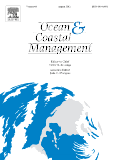
OCEAN & COASTAL MANAGEMENT
Innovating Solutions for Coastal ManagementOCEAN & COASTAL MANAGEMENT is a premier journal dedicated to the multifaceted fields of oceanography, aquatic science, and coastal management. Published by ELSEVIER SCI LTD and located in the United Kingdom, this esteemed journal boasts a remarkable Q1 ranking in prestigious categories, including Aquatic Science and Oceanography, reflecting its influential contributions to the field since its inception in 1992. The journal is recognized for its high impact, boasting a commendable presence in Scopus rankings across related disciplines, with notable placements in the 94th percentile for Aquatic Science and 92nd percentile for Oceanography. Although it operates under a subscription model, OCEAN & COASTAL MANAGEMENT continues to serve as a vital resource for researchers, professionals, and students seeking to advance their understanding of coastal ecosystems and effective management strategies. Through rigorous peer-reviewed research, the journal aims to foster knowledge exchange and practical applications in policy-making and environmental stewardship, making it an essential read for anyone engaged in the preservation and sustainable use of oceanic resources.

Ocean and Coastal Research
Navigating the challenges of marine resource management.Ocean and Coastal Research, published by the Institute Oceanográfico of the University of São Paulo, is an essential academic journal dedicated to advancing the fields of Aquatic Science, Oceanography, and Water Science and Technology. Established in 2020, the journal has quickly become a noteworthy platform contributing to the understanding and sustainable management of marine and coastal ecosystems, with an open access model that promotes the dissemination of critical research findings. Although currently categorized in the fourth quartile across its respective fields in 2023, the journal serves as an emerging repository of valuable insights for researchers, professionals, and students alike, aiming to make impactful discoveries that address contemporary challenges in ocean conservation and resource management. The journal's editorial team is committed to fostering interdisciplinary collaboration and upholding rigorous peer-review standards, thereby ensuring high-quality contributions that reflect the dynamic nature of marine science. With an E-ISSN of 2675-2824, all access to published articles is freely available, supporting global research efforts addressing crucial environmental issues.
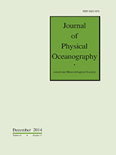
JOURNAL OF PHYSICAL OCEANOGRAPHY
Charting New Waters in OceanographyJOURNAL OF PHYSICAL OCEANOGRAPHY, published by the American Meteorological Society, stands at the forefront of the oceanographic research domain, with a distinguished history dating back to 1969. As a crucial resource for researchers, professionals, and students, this journal focuses on the physical aspects of our oceans, facilitating the dissemination of innovative studies that enhance our understanding of ocean dynamics, climate interactions, and marine ecosystems. With an impressive impact factor and a Q1 ranking in Oceanography, it ranks 30th out of 145 journals in the Earth and Planetary Sciences category (Scopus), placing it in the 79th percentile of its field. Its commitment to high-quality, peer-reviewed content ensures that the latest advances in oceanographic science are accessible to a global audience. Although the journal does not currently offer open access options, it remains a vital platform for cutting-edge research that shapes the future of oceanographic science and its applications.

Frontiers in Marine Science
Fostering Global Collaboration for Marine ScienceFrontiers in Marine Science, published by FRONTIERS MEDIA SA, stands as a leading open-access journal dedicated to advancing our understanding of marine ecosystems and their interconnectedness with global environmental systems. With a focus that spans a range of vital sub-disciplines including Aquatic Science, Oceanography, and Ocean Engineering, this journal has achieved prestigious rankings within the Q1 category in multiple areas as of 2023. The journal, thriving since its inception in 2014, promotes high-quality, peer-reviewed research that addresses critical challenges in marine and environmental science, making it an invaluable resource for researchers, professionals, and students alike. Located in Switzerland, Frontiers in Marine Science is committed to accessible scientific knowledge, boasting an impressive impact through a wide array of contributions from the global community. The journal's aim is to foster collaborative research efforts and innovative responses to the pressing issues facing our oceans and waterways today.
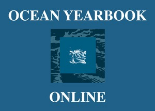
Ocean Yearbook
Illuminating the Intersection of Law and Oceanic StewardshipOcean Yearbook, published by BRILL, is a leading academic journal in the field of maritime law and ocean governance, providing a comprehensive platform for researchers and practitioners in this vital area. With an ISSN of 0191-8575 and E-ISSN 2211-6001, this journal offers valuable insights and critical analyses on contemporary issues affecting the world's oceans, promoting interdisciplinary dialogue among scholars in law, environmental studies, and policy-making. Currently ranked in the Q2 quartile for Law, this journal is positioned among the top-tier publications, reflecting its commitment to academic excellence and relevance. Ocean Yearbook is essential reading for those looking to stay abreast of legal developments and emerging challenges in ocean governance, contributing significantly to policy discussions and academic scholarship worldwide. Its accessibility through subscription, combined with its ongoing commitment to high-quality research, makes it an indispensable resource for students, researchers, and professionals dedicated to understanding and protecting marine ecosystems.